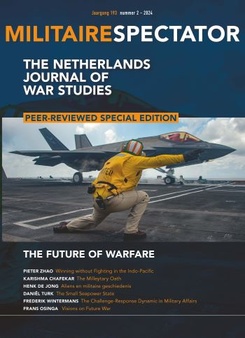War is a duel, a military confrontation between two or more actors. Warfare could then be defined as the activity in which an adversary is coerced to comply with the other party’s will in any way necessary – whether that is achieved by using information, diplomacy or military means.
After relishing the peace dividend and adjusting the thinking and organisation of its warfighting capabilities, the Western world has recently been confronted with major shocks – not only in the physical sense but also in its doctrinal thinking. We have come to realise that war and warfare were suspended but not discarded.
On 24 February 2022, interstate warfare returned to the European continent when Russia invaded Ukraine. The Russian coercive actions started with the annexation of Crimea in 2014, or arguably even earlier, with the interferences in the 2004 Ukrainian presidential elections, which led to the Orange Revolution protests. Further afield and more recently, in the Middle East on 7 October 2023, Hamas conducted a large-scale attack on Israel, after a decade of kinetic pin-prick attacks and fierce battles of narrative on social media.
While these conflicts do not herald a change in the nature of war, they pose pertinent questions on developments in the character of war. As Professor Frans Osinga elaborates on this in his essay ‘Visions on Future Warfare’: do the wars in and near Europe portend profound changes in the future of war and warfare? To what extent do new concepts and technology pose either risks or opportunities to our national security? How do contemporary trends interact with the enduring realities of war? And, ultimately, what can we learn from current conflicts and strategic competitions?
In this special blind-peer-reviewed edition of the Militaire Spectator – the Netherlands Journal of War Studies (NJWS) – several themes pertaining to the future of war are explored.
Pieter Zhoa focusses on the strategic developments of China’s maritime domain. However, he does not assess the expansion of the grey-hulled People’s Liberation Army Navy (PLAN), but his article centres around the maritime strategy in the grey-zone, occupied by unconventional or irregular maritime forces – China’s Coast Guard and the People’s Armed Forces Maritime Militia. He argues that China is developing a three-sea-force, in which the irregular forces assume China’s near-seas objectives, allowing the PLAN to focus on its blue-seas missions and capabilities.
On 23 September 2023, America’s most senior military officer, General Mark Milley, stated in his farewell speech that the US armed forces take an oath to the Constitution, not to a wannabe dictator. The military oath, according to Karishma Chafekar, serves as a trust mechanism in the legal framework of democratic civil-military relations to keep the constitutional order intact and working. Did the interpretation of the oath come under pressure in the relationship between General Milley and his then commander-in-chief, President Donald Trump?
Henk de Jong’s contribution – in Dutch – contends that military history and military science fiction are far from being opposites. Paradoxically enough, each future image has a foundation in the present. In the well-known novel Starship Troopers, the Mobile Infantry fought the Bugs. These insectoid adversaries were modelled on communists and served to convey the author’s criticism of Eisenhower’s decision to suspend nuclear testing. We must, therefore, be aware that also our present-day research into the future is inherently shaped by our contemporary frames of thought.
Daniel Turk offers an approach to evaluate the sea power of small states in a way that goes beyond the tendency to categorise naval power based on quantifiable military capabilities. The return of peer competitors at sea can be an impetus to forestall future fleet composition based on the role of navies and not on quantity.
Frederik Wintermans argues that the emergence of Multi-Domain Operations can best be understood as a dynamic between tackling a challenge and its response by the opponent, especially in the US-Russian relationship. We therefore need to learn how to anticipate adversarial developments of concepts better but also how to steer its threat perception.
